Family Therapy Symposium 2025: A Landmark Event in Malaysia
By: Dr. Ruziana Masiran
Program Director & Organising Committee Member,Family Therapy Symposium 2025, On behalf of the Department of Psychiatry, Hospital Sultan Abdul Aziz Shah/Faculty of Medicine & Health Sciences, Universiti Putra Malaysia (UPM),and the Andolfi Family Therapy Centre (AFTC), Kuala Lumpur, Malaysia.
Overview
The Family Therapy Symposium 2025, known as the 2-Day Live Consultation & Lecture by Professor Maurizio Andolfi, was held at Hospital Sultan Abdul Aziz Shah (HSAAS) on 28th and 29th April 2025. This symposium was a landmark event in the advancement of family therapy in Malaysia. Featuring the esteemed Professor Maurizio Andolfi, who is affiliated with the Accademia di Psicoterapia della Famiglia in Rome, Italy.
The symposium provided local and international mental health professionals with a world-renowned multigenerational approach to working with families, couples, and children with various psychological problems or psychiatric disorders. The event, jointly organised by the Andolfi Family Therapy Centre (AFTC) and the Department of Psychiatry, drew over 211 participants, including psychiatrists, clinical psychologists, counsellors, and allied mental health professionals from across the country, Southeast Asia regions such as China, Taiwan, Singapore, and Indonesia; and Australia.
Co-organisers: Department of Psychiatry, Faculty of Medicine and Health Sciences, Universiti Putra Malaysia, and Andolfi Family Therapy Centre, Kuala Lumpur
Sponsors: Malaysian Marriage and Family Therapy Association (MyMFT), Malaysian Educational and Psychological Wellbeing Society (MEPWS)
Objective
The two-day symposium was designed to enhance mental health professionals' clinical understanding and application of family therapy, focusing on a multigenerational approach. The program offered a unique learning experience through lectures, dialogues, observation of live consultations, and therapeutic processes involving real families. By witnessing these authentic clinical interactions, participants could appreciate the relational dynamics of families and the practical therapeutic techniques. Finally, the broader objective of the symposium was to inspire the development of a more family-centred approach to mental health care in Malaysia, fostering a shift toward interventions that recognise and integrate family systems in the treatment of mental health problems.
Highlights of the Event
Opening Ceremony
The hospital's Chief Operating Officer (COO), Associate Professor Dr Nor Fadhlina Zakaria, officiated the program.
Day 1: Children in Distress
In his lecture titled 'Children in Distress', Professor Maurizio Andolfi emphasised that children's presenting problems, such as anxiety, withdrawal, aggression, or school refusal, frequently represent a form of communication about distress within the family. He cautioned mental health professionals against making unnecessary diagnoses or labelling children with psychiatric illnesses without looking at the relational context.
Professor Andolfi further shared a video of a case of his multigenerational therapy sessions, during which multigenerational family figures not only helped uncover hidden family narratives, but also facilitated transformative healing experiences for the identified child and the family. This lecture strongly aligned with the symposium's aim to promote family-centred mental health care in Malaysia. It challenged mental health professionals to broaden their clinical frameworks and move beyond child-focused interventions toward a more inclusive, systemic approach.
A key session was the live consultation session in the afternoon. Dr Ruziana Masiran, UPM psychiatrist and family therapist, presented a case that reflected fairly common but challenging clinical and relational challenges. Subsequently, participants had a golden opportunity to observe Professor Andolfi in action - conducting a family therapy session.
This live session provided an authentic window into real-life therapeutic work within the Malaysian clinical context. After the session, Professor Andolfi facilitated a reflective supervision and learning discussion with five panellists. This dialogue allowed participants to explore the relational themes and unique but helpful techniques used during the session.
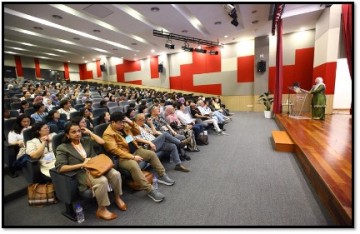
Figure 1: The COO of HSAAS, Associate Professor Dr Nor Fadhlina, giving her officiating speech during the opening ceremony.
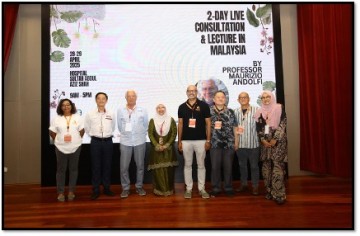
Figure 2: Photo 2. From (R) Dr Ruziana Masiran, Mr David Hong (AFTC), Dato’ Dr Lai Fong Hwa, Mr Darrel Devan Lourdes (AFTC), Associate Professor Dr Nor Fadhlina, Professor Maurizio Andolfi, Dr Chong Seng Choi, and Ms Bawany Chinapan (AFTC)
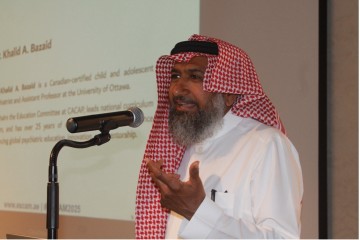
Figure 3: Photo 3. Participants in the auditorium of HSAAS.
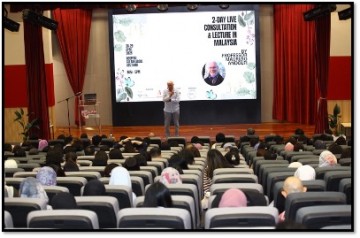
Figure 4: Photo 4. Professor Maurizio delivering his first lecture.
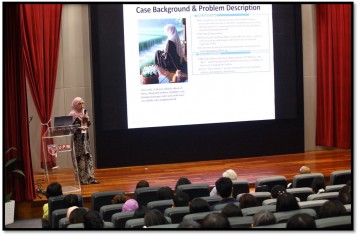
Figure 5: Photo 5. Dr Ruziana presenting her case.
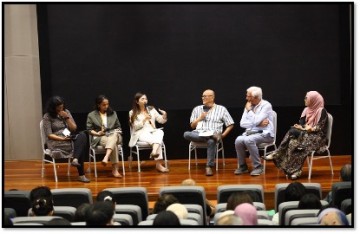
Figure 6: Panelists sharing feedback on the live consultation.
Day 2: Couple in Crisis
The second day focused on couple dynamics and emotional attunement in therapy. Through a mix of didactic lectures and case discussions in the lecture titled 'Couple in Crisis: Understanding Couple Therapy from Multigenerational Perspectives', Professor Maurizio Andolfi illuminated the deeper systemic roots of couple conflict, emphasising that relationship crises are rarely confined to the present-day dynamics between partners. Instead, he argued that unresolved issues from each partner's family of origin often resurface within the couple's relationship. Professor Andolfi urged therapists to explore beyond the couple dyad and view couple distress as an expression of transgenerational scripts that have yet to be processed.
The second lecture focused on 'When and How to Invite Family of Origin and Children as Consultants in Couple Therapy'. The latter provided a practical and relationally sensitive framework for including significant family members from family-of-origin (FOO) in couple therapy. According to Professor Andolfi, parents, siblings, and even children help clarify the historical and emotional backdrop of the couple's struggles. Nonetheless, he emphasised these individuals' careful timing and thoughtful invitation, ensuring that their presence in therapy is therapeutic and meaningful.
The afternoon's live consultation featured a therapy session with a real couple conducted by Professor Andolfi. Participants observed how he gently navigated entrenched patterns of conflict, mobilised the couple's godparents as the therapy 'consultants', and activated gratitude and appreciation between partners. Again, this was followed by a facilitated group debriefing with four panellists, during which the therapist's position and the dynamics shaped by generational emotional trauma were discussed.
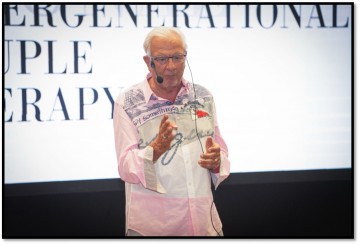
Figure 7: Professor Maurizio delivering his lecture on the second day.
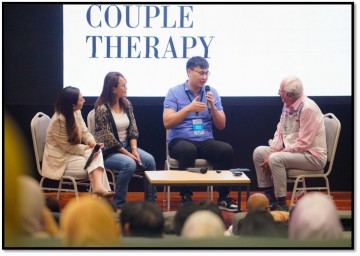
Figure 8: Photo 8. Participants' discussion session with Professor Maurizio.
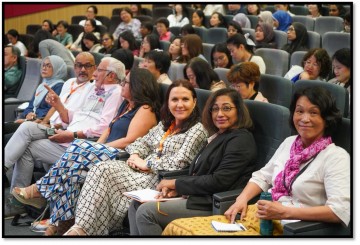
Figure 9: International and local participants on the second day of the event.
Closing Ceremony
Dr Ruziana, representing the organising committee, delivered a heartfelt closing speech expressing gratitude to all participants and acknowledging the event's success. She extended special appreciation to Professor Maurizio and Mr Darrell Devan Lourdes, the managing director of Andolfi Family Therapy Centre, for their insightful contributions and dedication. As a token of appreciation, Dr Ruziana presented them with commemorative gifts on behalf of the Faculty of Medicine & Health Science, Universiti Putra Malaysia
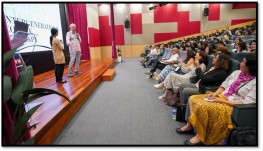
Figure 10: Questions and answers session with participants.
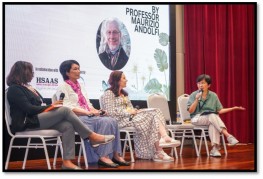
Figure 11: Panellists' session on the second day.
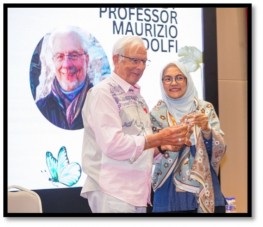
Figure 12: Symposium program director presenting gifts to the speaker and co-organiser during the closing ceremony.
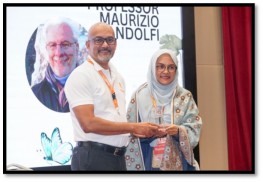
Figure 13: Symposium program director presenting gifts to the speaker and co-organiser during the closing ceremony.
Future Directions
This event served as a launchpad for broader family therapy initiatives in Malaysia and could act as a catalyst for developing supervision groups for Malaysian clinicians engaged in family work. Aligned with Universiti Putra Malaysia's aspiration to become the nation's leading centre of excellence in psychotherapy training, research, and clinical innovation, this symposium signals the university's bold and strategic commitment to shaping the future of systemic mental health care. UPM is poised to lead the national agenda in advancing psychotherapy and family-based interventions by building strong local capacity and fostering global partnerships.
Acknowledgements
Special thanks go to Chong Cheng Yee (KB/PA) and Cheryl Chin Yi Fen (KB/PA), both who were for being the backbone and brilliant masterminds behind the seamless execution of this event. Their dedication, meticulous planning, and tireless support truly made everything possible. I sincerely thank the committee members and volunteers from UPM, HSAAS, AFTC and MyMFT for their strong teamwork. Last but not least, thank you to the community of mental health professionals who attended the event for their commitment to advancing the field of family therapy.
This article represents the view of its author(s) and does not necessarily represent the view of the IACAPAP's bureau or executive committee.

